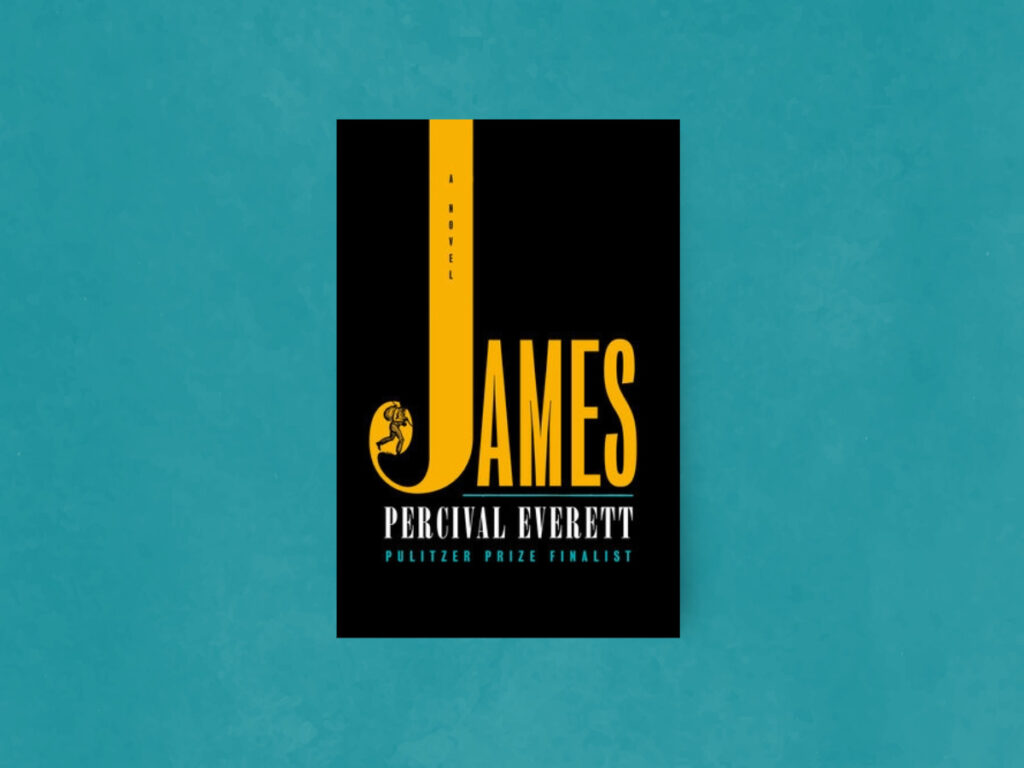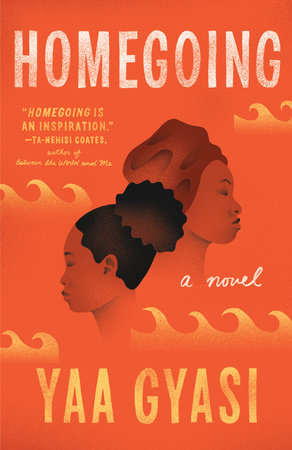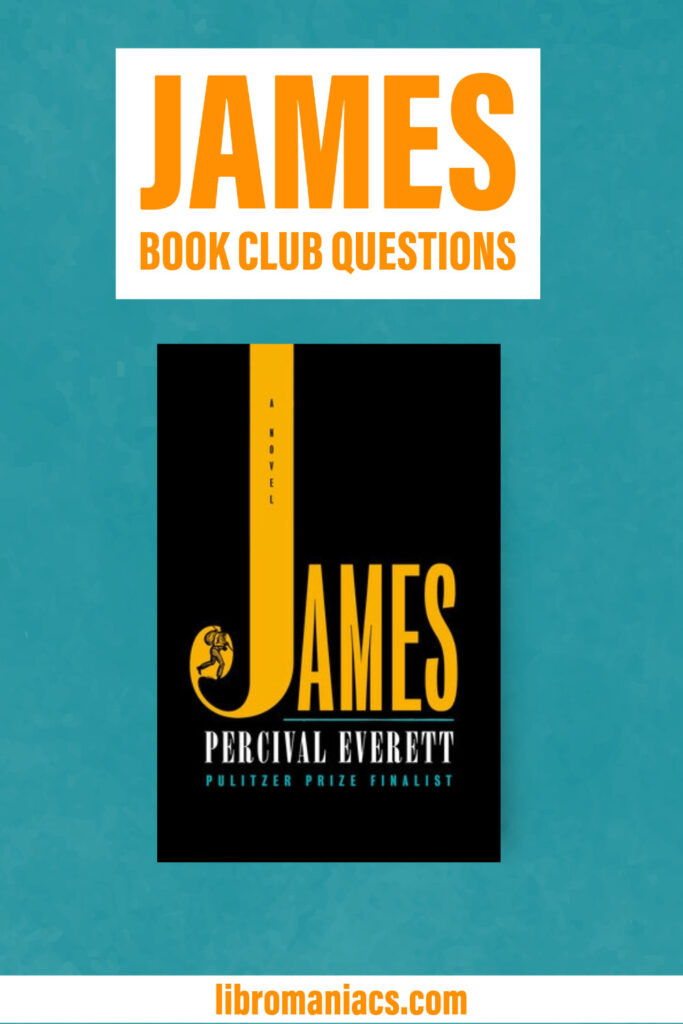Through his novel James, author Percival Everett brings forward a new voice from the classic American novel The Adventures of Huckleberry FInn, and challenges readers to experience this story from an incredibly challenging but important point of view. Jim may be a familiar character to those who have read Huckleberry Finn, but James shares his experiences and psyche in a new and significant way that is sure to give your book club plenty to discuss, even those who have not read the source material.
‘Jim’ has lived his entire life as a slave – but he is far from any stereotype he is forced to outwardly portray. He is incredibly intelligent and perceptive, and it’s through his lens that readers glimpse the devastatingly inhumane, unjust, and at times ironic life of a slave. This James Discussion Guide will help facilitate meaningful and potentially challenging conversation with your book club. In this guide, you’ll find 10 James Book Club questions, covering many of the novel’s most important themes such as the power of language, the importance of agency, abuse and racial stereotypes, and the strength of relationships. Additionally, this guide contains a synopsis, a selection of reader reviews, and three additional recommendations for your book club to consider when you’re ready to tackle your next read.

(This article contains affiliate links. This means that if you choose to purchase, I’ll make a small commission.)
Synopsis for James
(We always chose to provide the publisher synopsis because we feel that it’s worthwhile to discuss whether the official book description actually squared with your experience of the book.)
James, Percival Everett
When the enslaved Jim overhears that he is about to be sold to a man in New Orleans, separated from his wife and daughter forever, he decides to hide on nearby Jackson Island until he can formulate a plan. Meanwhile, Huck Finn has faked his own death to escape his violent father, recently returned to town. As all readers of American literature know, thus begins the dangerous and transcendent journey by raft down the Mississippi River toward the elusive and too-often-unreliable promise of the Free States and beyond.
While many narrative set pieces of Adventures of Huckleberry Finn remain in place (floods and storms, stumbling across both unexpected death and unexpected treasure in the myriad stopping points along the river’s banks, encountering the scam artists posing as the Duke and Dauphin…), Jim’s agency, intelligence and compassion are shown in a radically new light.
10 James Book Club Questions
These questions have been tailored to this book’s specific reading experience, but if you want more ideas, we also have an article with 101 generic book club questions.
- “White folks expect us to sound a certain way and it can only help if we don’t disappoint them.”
Discuss the way James and the other slaves change their speech (‘code-switching’) when around white people versus in private. Why was code-switching necessary? In what ways does the author portray code-switching as an act of irony? - Discuss the importance of Jim renaming himself James. How is his name change symbolic of many of the themes of this novel? Does your name hold any deeper significance to you?
- “Good ain’t got nuttin’ to do wif da law. Law says I’m a slave.”
Despite his relationship with James, Huck grapples with the fact that, by law, he is ‘stealing’ James by not returning him to Miss Watson. Discuss the relationship between law and morality. Should individuals hold themselves accountable to laws that violate a moral code?
- Discuss the dynamic between James and Huck. How did their relationship evolve throughout their travels, especially as James reveals their connection?
- Throughout the novel, James meets several other slaves and runaways (Young George, Easter, Norman, Luke, Sammy, Brock, and several others). How did the author use these interactions to demonstrate the various experiences and mindsets of slaves? Did any of these characters or interactions surprise you?
- How is religion portrayed in James? Do you believe this perspective is justified?
- Talk about ‘the pencil’. What does the pencil represent to James? Have you ever assigned a deeper meaning to a physical object?
- In what ways did James’ character change throughout the novel? Were there any key moments that you felt most contributed to his evolution?
- What do you think about Norman’s decision to maintain his identity as a black man and runaway slave, even though he was white-passing? Why do you think the author chose to include this narrative?
- Have you read The Adventures of Huckleberry Finn, and if so, how did that impact your reading of James?
- Bonus Question (excerpt from BBC discussion with author Percival Everett):
“The Adventures of Huckleberry Finn is no longer on the GCSE or A Level syllabus. To modern eyes, it’s too problematic. It’s even been banned by certain schools in America. Everett is opposed to book banning – although he told me, he hopes they might ban his new book ‘only because I like irritating those people who do not think and read.’”
What is your position on book-banning in America and/or in the educational system? Should books portraying specific themes, language, or viewpoints be banned and who, if anyone, should make that decision? Can ‘problematic’ books still teach us something?
Read the entire BBC article “Percival Everett: Why I rewrote Huckleberry Finn to give slave Jim a voice” here: https://www.bbc.com/news/entertainment-arts-68762352
Selected Reviews for James
(Use these selected Goodreads reviews to compare with your own experience of the book. Do you agree or disagree with the reviews?)
“Some books should never be touched – Huck Finn being one of them. Unless it’s Percival Everett. [James is ] a retelling of Huck Finn from the eyes of James, “Jim”, a runaway slave. It will enthrall you, sicken you, make you cry, laugh (though the “humor” is not easy), root for or against the soul of America, and make you wonder – have we ever really got over the shackles of slavery?”
“All through the book, Everett is showing us the psychological (and physical) cost of being a man in your mind while your body is, in law, owned by somebody else. The language switching is just part of that. The easy thing for Jim would be to surrender and think of himself as the slave the white world says he is…. but Jim refuses. The way that refusal is portrayed gives this book great power.”
“Everett is not the kind of writer to sketch out grand emotional scenes. There are several moments in the book that are sad, heartbreaking, and tragic from a plot and characterization standpoint. But he doesn’t write them in elongated, passionate crescendos that we’re used to from other writers. The writing style is matter-of-fact and the tone is blunt. And weirdly enough, that hit me in the gut a lot harder. We don’t need to be told when to scream or cry because what’s playing out in front of us paints a grim enough picture.”
“Maybe it’s the overload of satire that kept me at the arm’s length (or at least I sincerely hope I read that right as a satire). We went from one extreme to another – from Twain’s Jim being simple and childlike to Everett’s James being a sarcastic Voltaire-conversing erudite. I guess I was hoping for Jim/James to be explored more as a person… not extreme but a regular guy – a father, a husband, a friend – with no exaggerations needed to show his actual humanity and not a caricature or a statement and a channel for angry satire.”
3 Books like James
If you like this sideways look at a fictional work, we have a few suggestions for you. Try Hamnet by Maggie O’Farrell which covers Shakespeare’s wife and kids (book club guide for Hamnet). Or Kingsolver’s Demon Copperhead, which is a re-imagining of David Copperfield (Copperhead book club guide here).
For more narratives that deal with slavery, check out our guides for Let us Descend, Horse, and The Invention of Wings— each guide has a synopsis toward the top of the article.

Kindred, Octavia Butler
Kindred is the story of a young black woman living in 1970’s California who is inexplicably transported back in time to a plantation where her ancestors lived in early 1800’s Maryland. This novel explores life as a slave from a historical lens, but also from our main character’s ‘modern’ view, as she struggles to survive long enough to return to her life in real time. This is an excellent choice if your book club wants to explore more of the themes of slavery but also examine their lasting impacts on society.

Homegoing, Yaa Gyasi
Yaa Gyasi’s Homegoing is a multi-generational family saga that takes the reader down the two distinct paths of half-sisters Effia and Esi, one of whom is married into a British family living in Ghana, and the other of whom is sold into the slave trade and sent to America. Homegoing is full of themes that will create lively discussion at your next book club, including discussions of slavery and racism in America, the impacts of colonization and the slave trade in Africa, and many others.

Julia, Sandra Newman
If you enjoyed reading a familiar story from a new perspective in James, try Julia by Sandra Newman. This novel is a clever retelling of George Orwell’s 1984, from the perspective of the main character Winston’s love interest, Julia. Experiencing the tyrannical and terrifying world of 1984 from a woman’s perspective adds new layers to the original classic.
Share these James book club questions with your friends:

